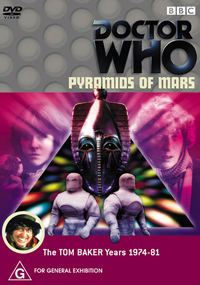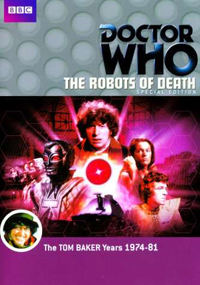On This Week’s ‘Doctor Who’, And Ripping Off The Classics
Doctor Who has never shied away from cribbing mercilessly from film, television, literature and theatre, meshing things that shouldn’t fit together into brilliant and original work.

This is a recap of the most recent episode of Doctor Who: ‘Mummy on the Orient Express’. Spoilers ahead.
–
Here’s the secret to doing science fiction: you just take a classic story and add “in space” to the end. Don’t believe me? The 1956 B movie classic Forbidden Planet is Shakespeare’s The Tempest in space. Fritz Lang’s Metropolis is the Jewish legend of the Golem of Prague. Avatar is basically Pocahontas, and Robinson Crusoe on Mars is, if memory serves, The Count of Monte Cristo.
Doctor Who has a proud tradition of such pastiches. Actually, over the past five decades it has a proud tradition of doing just about everything you can think of. But the most recent episode was called Mummy on the Orient Express, so let’s focus on the pastiches.
The majority of these classic call-backs came from the mid-1970s, during the first half of the Tom Baker era. Between 1975 and 1978, Terror of the Zygons was a reworking of Invasion of the Body Snatchers, The Brain of Morbius was Frankenstein, The Deadly Assassin was The Manchurian Candidate and The Androids of Tara was Prisoner of Zenda.
So what of Mummy on the Orient Express? Well hold on to your space hats, because it’s a crazy combination of The Mummy and Agatha Christie’s Murder on the Orient Express.
The Doctor has taken Clara for one last hurrah before she leaves him forever, and thinks that this futuristic recreation of the Orient Express would be the ideal trip. A combination of Earth anachronisms and interstellar travel, almost a microcosm of Doctor Who in itself. The guests, however, are slowly being killed off by a terrifying Mummy that only the victim can see — and special kudos to everyone involved in the making of this creature, because I was proper terrified.
It’s a wonderful set-up, and the merging of three distinct ideas – Mummy, Orient Express, space – is what makes Doctor Who so unique. Try to think of another show that can do this as a matter of course. I can’t hear you, so I’ll assume you couldn’t think of one.
It’s a significant emotional episode for Clara, which is why it’s odd she spends so much of it locked in a room. But the scenes between her and the Doctor — in which she tries to convey her very complex feelings to him, something he seems unequipped to deal with — are amongst the best the show has ever had. Is it too soon to call the Twelfth Doctor and Clara one of the all-time classic pairings?
I keep waiting for the edges to be sanded off Capaldi’s Doctor, but he really remains quite full-on, and in the best way possible. Often, the idea of the Doctor being “dark” is that he’ll be very rude and shouty whilst still saving everybody’s life. Here, it’s different. I can’t think of another Doctor who has been so dismissive of people once he knows they’re doomed. There’s a moment of redemption at the end, but think of that soldier in Into the Dalek, or Captain Quell in this story. The Doctor comes off as fairly callous towards the fated dead, but because there’s no cruel intent on his part, it sort-of fits. He’s sociopathically pragmatic about everything. He’s an alien, after all, and his values differ from ours. This characterisation is probably the most effective communication of this idea in the show’s history.
Doctor Who has never shied away from the fact that it cribs mercilessly from film, television, literature and theatre, keeping what works, discarding what doesn’t, and meshing things that shouldn’t fit together into a rather brilliant and original new work. With stories as good as this one, it’s clearly a winning formula. In space.
–
Questions To Ponder:
- When the Doctor was alone in his cabin, debating what to do, who exactly was he talking to? Was this a call back to episode four of this season, Listen, in which he theorised that there is someone always listening? Perhaps not. It sounds like the Doctor is actually talking to himself, or rather his past selves, as Peter Capaldi slips in and out of the best imitation of Fourth Doctor Tom Baker you’re likely to hear this side of Jon Culshaw.
- How many times has “Gus” tried to lure the Doctor onto the Orient Express? The Doctor says he’s tried many times before, and we’ve seen at least one of them: in the closing moments of 2011 season closer The Big Bang, the Eleventh Doctor receives a phone call informing him that an Egyptian goddess was “loose on the Orient Express… in space”.
- Is the Doctor’s favourite story 2005’s The Empty Child? He sure as hell keeps quoting it. That Ninth Doctor story featured a kid in a gas mask creepily asking everyone “Are you my mummy?”. When the Tenth Doctor puts a gas mask on in 2009’s The Poison Sky, he can’t resist an imitation, and in this episode when the Twelfth Doctor is face-to-face with a mummy, he… well, you know.
- The Doctor keeps jelly babies in a cigarette case? Perfect.
- I’m not familiar with Young Person’s Music. Were we happy with that Foxes cameo? Was it appropriate for her level of celebrity? I’m genuinely asking. I don’t know what her music is like, but she was singing Queen’s Don’t Stop Me Now in this episode, so I’m sold.
–
Throwback Thalday
Okay, what did you like most about Mummy on the Orient Express? Was it the space mummy, or the space Agatha Christie homage? Or the Tom Baker voice?
 If you liked the idea of a mummified creature lumbering after you, then you’ll want to pick up 1975’s Pyramids of Mars, a brilliant story in which the Fourth Doctor and Sarah Jane encounter alien-powered mummies, Egyptian curses, and travel to Mars for the hell of it. It’s pretty great. And they shot it at Mick Jagger’s house, so there’s that. True.
If you liked the idea of a mummified creature lumbering after you, then you’ll want to pick up 1975’s Pyramids of Mars, a brilliant story in which the Fourth Doctor and Sarah Jane encounter alien-powered mummies, Egyptian curses, and travel to Mars for the hell of it. It’s pretty great. And they shot it at Mick Jagger’s house, so there’s that. True.
 If you preferred the Agatha Christie-ness of this story, then you should instead pick up 1977’s The Robots of Death, one of the most beloved Doctor Who stories of all time: the Fourth Doctor and Leela arrive on an enormous mining vessel in which the crew are being picked off one by one. Those familiar with the Agatha Christie cannon will quickly recognise the influence of And Then There Were None (or Ten Little Indians if you prefer, which I sincerely hope you don’t).
If you preferred the Agatha Christie-ness of this story, then you should instead pick up 1977’s The Robots of Death, one of the most beloved Doctor Who stories of all time: the Fourth Doctor and Leela arrive on an enormous mining vessel in which the crew are being picked off one by one. Those familiar with the Agatha Christie cannon will quickly recognise the influence of And Then There Were None (or Ten Little Indians if you prefer, which I sincerely hope you don’t).
It’s exciting, funny, and full of great ideas, underscoring the idea that Doctor Who never fails when borrowing liberally from one of history’s greatest ever mystery writers.
–
Lee Zachariah is a writer and journalist. He co-hosted the ABC2 film comedy series The Bazura Project, and is a co-presenter of film podcast Hell Is For Hyphenates. He tweets at @leezachariah




